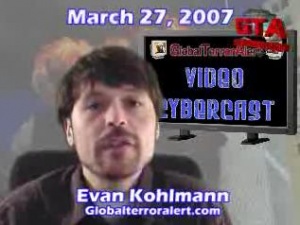 Terrorism expert Evan Kohlmann appearing as presenter in his 'Video Cybercast' Welcome to the Terrorism Expertise Portal on Powerbase. It links to a wide range of organisations, think-tanks, academic research institutes, front groups and individual experts which shape the views of the public, policy makers and elites on 'terrorism' and political violence. View our A-Z list of articles on individuals and institutions.
The editor of the Terrorexpertise Portal is Tom Mills. You can email him: tom.mills AT Powerbase.info.
Powerbase has a policy of strict referencing and is overseen by a Managing editor and a Sysop and several Associate Portal editors.
|
What is a Terrorism Expert?
|
|
As the Campaign Against Criminalising Communities puts it:
- Academic terrorism 'experts' - or terrorologists - are deeply embedded in the elite power structure. They conveniently blur distinctions between political dissent, resistance to oppressive regimes, and violent threats to populations. These experts advise governments on counter-terrorism, thus sanitising Western state terror as legitimate techniques for self-defence. Where did these terrorologists come from? How do they gain influence and credibility? How can they be countered?'[1]
The Jewish American historian Joel Beinin comments that:
- A new field of "terrorology" emerged, with its own journals, conferences, and research institutes. This popular and scholarly literature informed the discourse of the first American "war on terrorism" during the mid-1980s.Middle East Studies Association members, to our everlasting shame according to some pundits, did not participate much in the scholarly field of terrorology. In my view, there was great wisdom in this abstention. The terrorologists have not accomplished a great deal of practical or intellectual significance. Their studies have not noticeably decreased the incidence of acts of violence against civilians throughout the world. Nor have they enhanced our understanding of the causes of such acts. What they have done is to focus attention on tactics and symptoms, thereby impeding investigation into historical and social causes. This is an ostensibly pragmatic, but fundamentally misguided, approach to understanding terrorism. If the term is to be understood in any useful rather than propagandistic way, terrorism must be regarded as a social and historical phenomenon, not a moral or political epithet.[2].
What is a terrorist, and what is a terrorologist? See an introduction to the topic here.
|
Research
|
Methodology
Compilation Lists
Expert's Influence Lists
Institution's Influence Lists
|
Recent Articles on SpinWatch
|
|
|
|
Categories
|
|
All pages associated with the Terrorism Expertise Portal are listed here.
There are also a number of distinct sub-categories listed below. You can click on any of these links to display an A-Z list of all pages in that category.
There are also a number of pages on Powerbase which specifically examine the terrorism research activities of particular institutions which are also involved in other research areas. The name of these pages is preceded by the phrase 'terrorexpertise:'. For example, there is a page on Powerbase on the U.S. think-tank the RAND Corporation, and a related page terrorexpertise:RAND Corporation examining RAND's terrorism related research.
|
New pages on Powerbase
|
|
<DynamicArticleList>
title=Newest Pages
type=new
count=10
</DynamicArticleList>
|
|
<DynamicArticleList>
title=Recently Updated Articles
type=update
count=10
</DynamicArticleList>
|
|
References and Resources
|
External links on Terrorology
- Abraham, Nabeel, The Running Dogs Of Terrorology, Lies Of Our Times, May 1993, pp. 6-8.
- Jonny Burnett and Dave Whyte 'Embedded Expertise and the New Terrorism' Journal for Crime, conflict and Media culture, 2004 [1]
- Chomsky, N. 'International Terrorism: Image and Reality' In Alexander George (ed.), Western State Terrorism, Polity, 1991. http://www.chomsky.info/articles/199112--02.htm
- Herman, Edward S. The Real Terror Network, excerpted from the book, published in 1982 by South End Press.
- McClintock, Michael Instruments of Statecraft: US Guerilla Warfare, Counterinsurgency, and counterterrorism, 1940-1990, New York: Pantheon Books.
- Toolis, K. 'Rise of the terrorist professors', New Statesman, 14 June 2004.
- James Petras, The Anatomy of "Terror Experts", Counterpunch, 7 August 2004.
- Edward Herman and David Peterson, There Is No "War on Terror", ZNet, 18 January 2008.
|
|
|
Disclaimer: Powerbase is an encyclopedia of people, issues and groups shaping the public agenda. It is a project of the Spinwatch—email editor AT Powerbase.info.
Antispam note: To avoid attracting spam email robots, email addresses on Powerbase are written with AT in place of the usual symbol, and we have removed "mail to" links. Replace AT with the correct symbol to get a valid address. We regret the inconvenience this entails. Campaign for more effective antispam regulations.
|
|
References
|
|